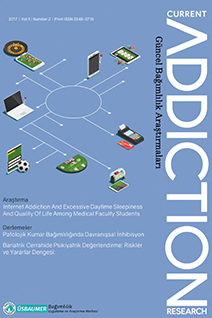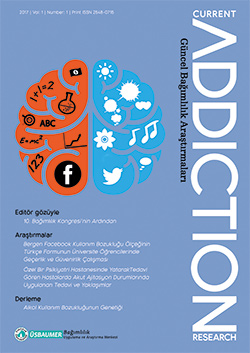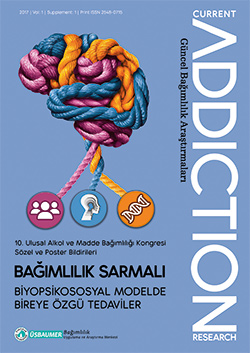ARTICLES
Original Article
Investigation of the Relationship Between Social Media Use and Life Satisfaction Level
Şule DOYAROĞLU,Cemal Onur NOYAN
2023, 7(2), s:5-12
In this study, the relationship between social media use disorder and life satisfaction in adults was examined. 221 adult individuals participated in the study. Sociodemographic Information Form, Social Media Addiction Scale (SMAS) and Satisfaction with Life Scale were applied to the participants. The survey responses of the participants were entered into SPSS 28.0 package software and statistical analyzes were conducted. Independent sample t-test and one-way ANOVA were applied for comparisons in terms of sociodemographic variables. Pearson correlation was applied to examine the relationship between social media use disorder and life satisfaction. Multiple regression analysis was applied to examine the prediction of life satisfaction by social media. use disorder to the findings of the study, male participants had higher social media use disorder scores than female participants. On the other hand, as the time spent on social media and the number of social media applications increased, social media use disorder scores increased. On the other hand, the social media use disorder scores of single participants and participants reporting low education level were found to be significantly higher. When the findings related to life satisfaction were analyzed, it was found that the life satisfaction scores of the participants who were married, had a higher income level and were employed were significantly higher. When the relationship between life satisfaction and social media use disorder scores was analyzed, it was found that there was a significant relationship between the increase in social media scores and the decrease in life satisfaction scores. In addition, it was found that the conflict sub-dimension of social media use disorder predicted life satisfaction negatively and significantly. The findings of the study are expected to contribute to future applications and researches in terms of understanding the factors related to social media use, which has become an indispensable part of daily life.
Original Article
Ceren GÜNGÖR,Cemal Onur NOYAN
2023, 7(2), s:13-18
Objective: This study was designed to investigate the relationship between family involvement, stigmatization, perceived social support, and treatment motivation in drug addiction treatment.
Method: The participants of our study consisted of individuals receiving substance use disorder treatment at the NP Brain Hospital AMATEM service and the Green Crescent Counseling Center (YEDAM). The research included a total of 98 voluntary participants, including 88 males and 10 females, aged 18 and above, receiving substance use disorder treatment. Among the participants, 57 had family involvement in the treatment, while the remaining 41 did not have their families involved in the treatment process. Data were collected using the Personal Information Form, the YEDAM Substance Addiction Stigmatization Scale (YMBSÖ), the Multidimensional Perceived Social Support Scale (ÇBADÖ), and the Treatment Motivation Questionnaire (TMA).
Results: When the results were evaluated, a significant relationship was found between the family subscale of perceived social support and the treatment confidence subscale of the treatment motivation questionnaire. Among the subscales of the Treatment Motivation Questionnaire, the score for seeking interpersonal help was higher in patients whose families were involved in the treatment. When the stigma scores of participants living alone were compared with those living with their families, it was concluded that individuals living alone had higher stigma scores.
Conclusion: The findings from our study have shown that substance addiction negatively affects many essential aspects of patients' lives, such as their social relationships, family and environmental connections, as well as their work and academic lives. Substance addiction, which is becoming an increasingly significant societal issue, requires a multidisciplinary approach that involves not only medical treatment but also the involvement of families and society in order to regulate individuals' social lives, education and work lives, and family and environmental relationships.
Review Article
Self-Help Groups: Their Role In Addıction Treatment
Simge ALEVSAÇANLAR CÜCÜ
2023, 7(2), s:19-25
Self-help groups are organizations where individuals with common concerns, issues, or struggles come together to share their experiences and provide support to each other. These groups can address a variety of challenges such as addiction, mental health issues, health problems, grief, divorce, and other difficulties in life. There are numerous studies worldwide, including in our country, demonstrating the effectiveness of self-help groups in addiction treatment, such as Alcoholics Anonymous and Narcotics Anonymous. This study aims to understand the functions of self-help groups and their significance and role in addiction treatment.
Review Article
Addiction and Emotion-Focused Couple Therapy
Gül ERYILMAZ,Burcu YÜCETÜRK
2023, 7(2), s:26-35
Dependence; It is a disease with biological, psychological and social aspects. Especially the deterioration in family function has caused this disease to be considered as a family disease at the same time. These families need help and counseling in social relations, communication, economic problems, domestic violence and negative emotions. In this review article, emotion-focused couple therapy practices in the spouse problems of addicted patients are summarized.



 2. Sayı
2. Sayı
 1. Sayı
1. Sayı
 Ek Sayı
Ek Sayı







